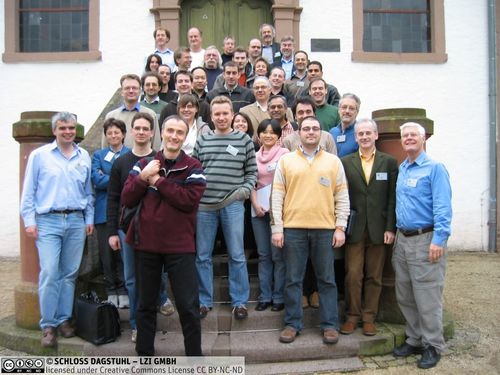Dagstuhl Seminar 05462
Service Oriented Computing (SOC)
( Nov 15 – Nov 18, 2005 )
Permalink
Organizers
- Fabio Casati (HP Labs - Palo Alto, US)
- Francisco Curbera (IBM TJ Watson Research Center - Yorktown Heights, US)
- Bernd Krämer (FernUniversität in Hagen, DE)
- Michael P. Papazoglou (Tilburg University, NL)
Contact
Service-Oriented Computing (SOC) is a new computing paradigm that utilizes services as the basic constructs to support the development of rapid, low-cost and easy composition of distributed applications even in heterogeneous environments. The visionary promise of Service-Oriented Computing is a world of cooperating services where application components are assembled with little effort into a network of services that can be loosely coupled to create flexible dynamic business processes and agile applications that may span organisations and computing platforms. SOC is being shaped by, and increasingly will help shape, modern society as a whole, especially in the areas of dynamic and ondemand business and education, health and government services.
The subject of SOC is vast and enormously complex, spanning many concepts and technologies that find their origins in diverse disciplines that are woven together in an intricate manner. In addition, there is a need to merge technology with an understanding of business processes and organizational structures, a combination of recognizing an enterprise's pain points and the potential solutions that can be applied to correct them. The material in research spans an immense and diverse spectrum of literature, in origin and in character. As a result research activities at both worldwide as well as at European level are very fragmented. This necessitates that a broader vision and perspective be established - one that permeates and transforms the fundamental requirements of complex applications that require the use of the SOC paradigm. This will further enhance the value proposition of Service-Oriented Computing and will facilitate the formulation of a Services Research Roadmap leading to more effective and clearly inter-related solutions and better exploitation of research results.
The research Roadmap provides the necessary background for deciding on potential future research programmes in SOC and places on-going research activities and projects in the broader context of a SOC Roadmap. It launches four pivotal, inherently related, research themes to SOC: service foundations, service composition, service management and monitoring and service-oriented engineering. The viewpoints presented in the research Roadmap partly result from intensive discussions experts with various backgrounds led in parallel workgroup and in plenary sessions.
- Marco Aiello (TU Wien, AT) [dblp]
- Michael Averstegge (FernUniversität in Hagen, DE)
- Luciano Baresi (Polytechnic University of Milan, IT) [dblp]
- Boualem Benatallah (UNSW - Sydney, AU)
- Francisco Curbera (IBM TJ Watson Research Center - Yorktown Heights, US) [dblp]
- Vincenzo D'Andrea (Università di Trento, IT)
- Asit Dan (IBM TJ Watson Research Center - Yorktown Heights, US)
- Flavio de Paoli (Universita Bocconi, IT)
- Schahram Dustdar (TU Wien, AT) [dblp]
- Andreas Heß (VU University Amsterdam, NL)
- Jens Hündling (Hasso-Plattner-Institut - Potsdam, DE)
- Monika Kaczmarek (Poznan University of Economics, PL)
- Gerti Kappel (TU Wien, AT) [dblp]
- Wolfgang Kellerer (DOCOMO Euro-Labs - München, DE) [dblp]
- Michael Klein (KIT - Karlsruher Institut für Technologie, DE)
- Bernd Krämer (FernUniversität in Hagen, DE)
- Dominik Kuropka (Hasso-Plattner-Institut - Potsdam, DE)
- Winfried Lamersdorf (Universität Hamburg, DE) [dblp]
- Frank Leymann (Universität Stuttgart, DE) [dblp]
- Heiko Ludwig (IBM TJ Watson Research Center - Hawthorne, US) [dblp]
- Tiziana Margaria (Universität Göttingen, DE) [dblp]
- Peter Massuthe (HU Berlin, DE)
- Andrea Maurino (Universita Bicocca - Milan, IT) [dblp]
- Michael Maximilien (IBM Almaden Center, US) [dblp]
- Michael P. Papazoglou (Tilburg University, NL)
- Barbara Pernici (Polytechnic University of Milan, IT) [dblp]
- Charles Petrie (Stanford University, US)
- Pierluigi Plebani (Polytechnic University of Milan, IT)
- Alexander Rausch (Hasso-Plattner-Institut - Potsdam, DE)
- Thomas Risse (Fraunhofer Institut - Darmstadt, DE)
- Sabine Rittmann (TU München, DE)
- Dieter H. Roller (IBM Deutschland - Böblingen, DE)
- Heinz W. Schmidt (Monash University - Clayton, AU) [dblp]
- Bernhard Steffen (TU Dortmund, DE) [dblp]
- Stefan Tai (IBM TJ Watson Research Center - Hawthorne, US) [dblp]
- Willem-Jan van den Heuvel (Tilburg University, NL)
- Martin von Löwis (Hasso-Plattner-Institut - Potsdam, DE)
- Xia Wang (FernUniversität in Hagen, DE)
- Michal Zaremba (National University of Ireland - Galway, IE)
- Christian Zirpins (Universität Hamburg, DE)
Classification
- Software-Engeneering
- multimedia
- web
Keywords
- Web service engineering
- cross-enterprise computing
- service description
- service publication
- matching + composition
- service life-cycle


